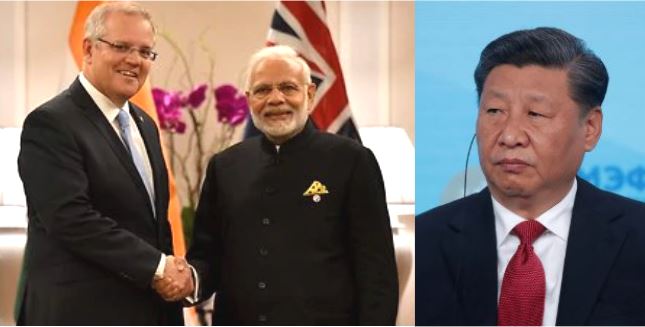The diplomatic feud between Australia and China is getting uglier by the day. The Xi Jinping regime is trying all the dirty tricks in the book to pin down the Scott Morrison government into submission. After slapping an 80% tariff on Australian barley imports and banning meat imports from four abattoirs citing Australia was breaching “anti-dumping” regulations and subsidizing the industry, Beijing is now threatening to escalate the ‘Trade-wars’ with further restrictions on Coal and Iron-ore imports.
Even when relentless economic duress is being applied by Beijing–the Australian government has not folded and stood its ground. Instead of mollycoddling China, Canberra has turned to India and Prime Minister Narendra Modi for a way-out.
Scott Morrison will use a June 4 virtual summit with PM Modi to ramp up efforts to diversify Australia’s export markets and find trusted suppliers of vital products and components.
Both countries will be looking to cement new agreements to develop reliable supply chains in key strategic sectors, including medical goods, technology, and critical minerals, amid heightened tensions with China.
A post COVID world will be a different reality altogether and Australia has had just about enough of China’s tantrums. Currently heavily reliant on the Chinese for trade, the Australians have been pushed in the corner, as a result. To avoid such scenarios in the future—Australia is looking to diversify its resources and the first nation it has reached out to is India.
Sources have cited that the duo of Modi-Morrison will seal a new defense agreement allowing reciprocal access to bases and co-operation on military technology projects.
After China threatened Australia that Chinese students will boycott its colleges and Universities—a new education partnership will also be on the table to help overcome Australian university reliance on Chinese students.
According to a Guardian report, “Australia has vowed to stand up to China”. The war of words has continued from the Chinese side as Beijing’s foreign ministry spokesman, Zhao Lijian, called on Australia to “change its course, completely give up its political maneuver and return to the broad consensus of the international community”.
Meanwhile, the propaganda mouthpiece of China, Global Times, which had earlier compared Australia to a ‘chewing gum’ has come up with another distasteful comment. On Tuesday it quoted an unnamed Weibo user as likening Australia to a “giant kangaroo that serves as a dog of the US”.
Beijing will not concede that the economic measures are retaliation for Australia’s forthright pursuit of a COVID-19 inquiry, but it does not take much for anyone with a surface-level knowledge about politics to figure out that China is trying to strong-arm Australia.
China ultimately backed a watered-down resolution for the inquiry brought by the European Union and co-sponsored by more than 100 countries including India. But the world recognizes that when the other big powers failed to go on an offense against China, it was Australia that kept the fire of an international inquiry burning by putting pressure on the dragon.
European Union ambassador Michael Pulch said on record, “It was Australia who put the idea for an investigation on the table.”
Despite China’s vile skirmishes, Foreign Minister Marisa Payne has iterated that the country will look to solve the issue amicably through bilateral channels, and only if it fails, the country will proceed to the international trade Umpire—World Trade Organisation.
The Kangaroos are not backing down, albeit on the contrary slogging even harder with the Chinese. After thwarting China’s pressure tactics, Beijing has come up with one final weapon in its arsenal—the trade war.
But with Australia shifting its attention towards India, who Morrison had described as a ‘natural partner’, China might be feeling a bit queasy.
By working closely with India, Australia hopes to lessen its reliance on Chinese technology and contribute to new standards that will prevent Beijing from setting the ground rules in key areas.
For India, it is killing two birds with one stone—angering China, keeping it at bay, taking away its business whilst increasing trade, defence, pharmaceutical, and educational relations with Australia that will ultimately improve the country’s finance’s in the post-COVID-19 world. A total win-win situation.
